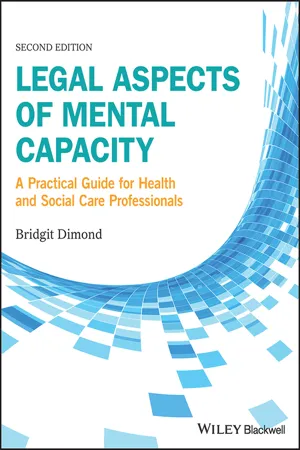
Legal Aspects of Mental Capacity
A Practical Guide for Health and Social Care Professionals
- English
- ePUB (mobile friendly)
- Available on iOS & Android
Legal Aspects of Mental Capacity
A Practical Guide for Health and Social Care Professionals
About this book
A Practical Guide for Health and Social Care Professionals
SECOND EDITION
Praise for the first edition:
"Invaluable in negotiating the legal minefield that surrounds the complicated issue of mental capacity."
Mental Health Practice
"In Dimond's Legal Aspects of Mental Capacity, we find a well-crafted reference book that goes beyond mere presentation of the law and relevant regulations."
Metapsychology
The Mental Capacity Act (2005) regulates decision-making processes on behalf of adults who are unable to give informed consent due to a loss in mental capacity (be that from birth or due to an illness or injury at some point in their lives). Since the act's implementation, the new Court of Protection has been firmly established, and there have been significant Supreme Court cases, as well as further guidance on the 2005 Act and major developments in the use and assessment for Deprivation of Liberty Safeguards.
Thoroughly updated to take into account the many updates, developments, and changes in legislation and guidance, the new edition of Dimond's authoritative guide will be warmly welcome by practitioners and students who need to understand and work within the Mental Capacity Act and how it applies to their professional responsibilities.
- A highly practical guide to the Mental Capacity Act and its provisions since its conception in 2005
- Relevant for a wide range of practitioners and students within health and social care
- Highly readable and easily accessible, even for those with no legal background
- Includes a range of learning features, including scenarios, questions and answers, key summary points, and applications for practice.
Legal Aspects of Mental Capacity is an essential resource for all healthcare and social services professionals, students, patient services managers, and carers working with those who lack the capacity to make their own decisions.
Frequently asked questions
- Essential is ideal for learners and professionals who enjoy exploring a wide range of subjects. Access the Essential Library with 800,000+ trusted titles and best-sellers across business, personal growth, and the humanities. Includes unlimited reading time and Standard Read Aloud voice.
- Complete: Perfect for advanced learners and researchers needing full, unrestricted access. Unlock 1.4M+ books across hundreds of subjects, including academic and specialized titles. The Complete Plan also includes advanced features like Premium Read Aloud and Research Assistant.
Please note we cannot support devices running on iOS 13 and Android 7 or earlier. Learn more about using the app.
Information
CHAPTER 1
Introduction: Anatomy of the Mental Capacity Act and its terms
- A person must be assumed to have capacity unless it is established that he or she lacks capacity.
- A person is not to be treated as unable to make a decision unless all practicable steps to help him or her to do so have been taken without success.
- A person is not to be treated as unable to make a decision merely because he or she makes an unwise decision.
- An act done, or decision made, under this Act for or on behalf of a person who lacks capacity must be done, or made, in his or her best interests.
- Before the act is done, or the decision is made, regard must be had to whether the purpose for which it is needed can be as effectively achieved in a way that is less restrictive of the person’s rights and freedom of action.
Table of contents
- Cover
- Title Page
- Table of Contents
- Preface
- Acknowledgements
- Table of cases
- Table of statutes
- Glossary
- List of abbreviations
- CHAPTER 1: Introduction
- CHAPTER 2: Background to the legal system and the Mental Capacity Act
- CHAPTER 3: Human rights and statutory principles for governing decision making
- CHAPTER 4: Definition of mental capacity
- CHAPTER 5: Making decisions in the best interests of others
- CHAPTER 6: Lasting powers of attorney
- CHAPTER 7: Court of Protection, court-appointeddeputies, the Office of the Public Guardian, and visitors
- CHAPTER 8: Independent mental capacity advocates
- CHAPTER 9: Advance decisions
- CHAPTER 10: Research
- CHAPTER 11: Protection of vulnerable adults and accountability
- CHAPTER 12: Children and young persons
- CHAPTER 13: Mental capacity and mental disorder
- CHAPTER 14: Deprivation of liberty safeguards
- CHAPTER 15: Organ and tissue removal, storage, and use
- CHAPTER 16: The informal carer
- CHAPTER 17: Implementation, resources, and Code of Practice
- CHAPTER 18: Wales, Scotland, and Northern Ireland
- CHAPTER 19: The future
- Websites
- Answers to quick fire quizzes
- Recommended further reading
- Index
- End User License Agreement